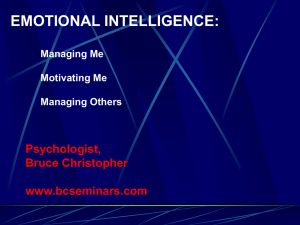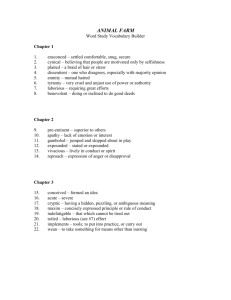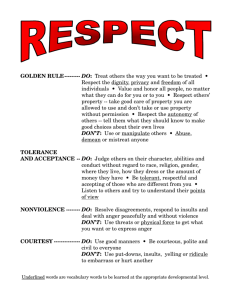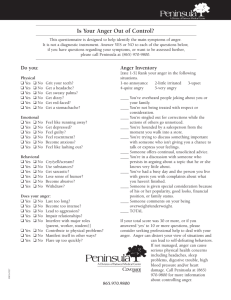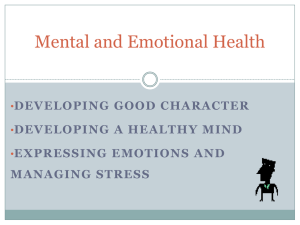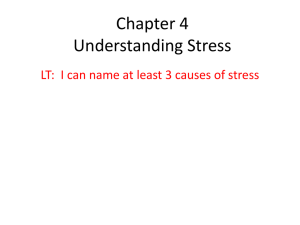Anger
advertisement
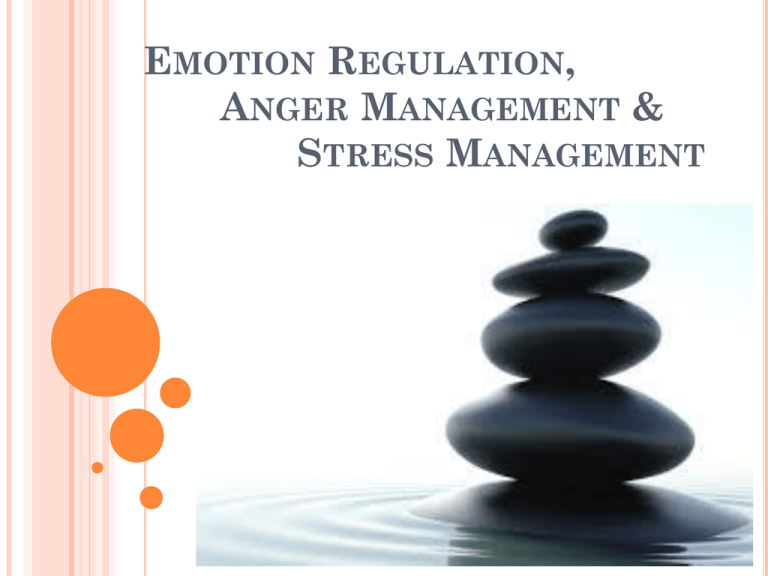
EMOTION REGULATION, ANGER MANAGEMENT & STRESS MANAGEMENT STRUCTURE 1. Emotion Regulation 1.1 Definition Emotion 1.2 Model of Emotion Regulation 2. Anger Management 2.1 Definition Anger 2.2 Main Approaches of Anger Management 2.3 Anger Management Techniques 2.4 Avoid Escalation & Control Yourself! 3. Stress Management 3.1 Definition Stress 3.2 What is Stress –Video 3.3 Stress Management Techniques 3.4 Progressive Muscle Training EMOTION REGULATION How can I control my Emotions? DEFINITION EMOTION Emotions are subjective experiences characterized primarily by psychophysiological expressions, biological reactions, and mental states certain emotions are universally recognized, even in cultures that are preliterate (Paul Eckman) six basic emotions: 1. 2. 3. 4. 5. 6. anger disgust fear happiness sadness surprise ECKMAN’S BASIC EMOTIONS MODEL OF EMOTION REGULATION Process of Emotion generation: 1. Situation: 2. Attention Appraisal: Response: 3. 4. situation (real or imagined) that is emotionally relevant. attention is directed towards emotional situation emotional situation is evaluated and interpreted an emotional response is generated, giving rise to a behavioral, a physiological response Each point can be subjected to regulation: 2. Situation selection: Attentional deployment: 3. Cognitive change: 4. Response modulation 1. avoid emotionally situations direct attention towards or away from an emotional situation change how one appraises a situation (Distancing, Reinterpretation, Humor) influence behavioral & physiological response ANGER MANAGEMENT How can I control my anger? DEFINITION ANGER Anger is "an emotional state that varies in intensity from mild irritation to intense fury and rage” accompanied by physiological and biological changes (heart rate, blood pressure, levels of your energy hormones, adrenaline, and noradrenaline increase) caused by external and internal events Expressing Anger Anger is a natural, adaptive response to threats: powerful, aggressive, feelings and behaviors, allow us to fight and to defend ourselves when attacked laws, social norms, and common sense limits anger expression GROUP WORK 1. Think of recent situations that made you angry (At home, at work, with friends, with family, with collegues etc.) 2. Discuss with the person to your left what you do when angry: What helps you control your anger? What makes the situation worse? 3. Write the points on a paper and explain them to the group MAIN APPROACHES OF 1. Expressing the anger 2. make clear what your needs are, and how to get them met, without hurting others but by being respectful of yourself and others Supressing, converting & redirecting the anger 3. ANGER MANAGEMENT hold in your anger, stop thinking about it, focus on something positive and convert the anger into more constructive behavior Calming down control your internal responses, taking steps to lower your heart rate, calm yourself down, and let the feelings subside. "when none of these three techniques work, that's when someone—or something—is going to get hurt.“ (Dr. Spielberger) ANGER MANAGEMENT TECHNIQUES Relaxation Deep breathing and relaxing imagery Cognitive Restructuring Try replacing exaggerated and dramatic thoughts with more rational ones Remind yourself that getting angry won't make you feel better and may actually make you feel worse Problem Solving focus on how to handle and face a problem Better Communication Don’t jump to conclusions or say the first thing on your mind. Slow down and think through your response. Listen carefully to what the other person is saying and take your time before answering Changing Environment Give yourself a break from some people and the surrounding. Make sure you have some "personal time" scheduled for times of the day AVOID ESCALATION & CONTROL YOURSELF! 1. Stop 2. Give yourself space 3. Breathe deeply When angry, heart rate is increased, breathing is rapid, face is flushed, or voice is raised Breathing deeply fills body with oxygen: Adrenaline rush will stop. Extra oxygen will relax body, clam breathing, slow heart rate, and allow brain to resume rational thought 4. Analyze Look at the situation as an outsider to see the truth 5. Define the problem describe the problem in one or two sentences. Put it in clear, plain words that exactly state the real issue that sparked your anger 6. Solve the problem STRESS MANAGEMENT How can I deal with stress? DEFINITION STRESS Stress can be a reaction to a short-lived situation or it can last a long time if dealing with serious situations. Stress becomes dangerous when it interferes with ability to live a normal life over an extended period. You may feel tired, unable to concentrate or irritable. Stress can also damage physical health. WHAT IS STRESS? https://www.youtube.com/watch?v=s93ywqFa6CM STRESSORS IN WORK ENVIRONMENT What is causing you stress in Mure Memorial Hospital? Most common stressors mentioned by employees: The way employees are treated by their bosses/supervisors or company Lack of job security Company policies Coworkers who don't do their fair share Unclear expectations Poor communication Not enough control over assignments Inadequate pay or benefits Urgent deadlines Too much work Long hours Uncomfortable physical conditions Relationship conflicts Coworkers making careless mistakes Dealing with rude customers Lack of cooperation How the company treats coworkers STRESSORS IN WORK ENVIRONMENT Medical environment stress A study was done on the stress levels in general practitioners and hospital consultants in 1994. Over 500 medical employees participated in this study done by Dr. R.P Caplan. Results: 47% of workers scored high levels of stress 27% of the general practitioners scored to be very depressed nearly 54% of workers suffered from anxiety while being in the hospital STRESS MANAGEMENT TECHNIQUES Autogenic training & Progressive relaxation Social activity Relaxation techniques & Meditation Reading novels Deep breathing & Yoga Time management Natural medicine Homour Prayer Getting a hobby Physical exercise Listening to certain types of relaxing Music Spending quality time with friends Artistic expression Spending time in nature PROGRESSIVE MUSCLE TRAINING LITERATURE http://psychcentral.com/blog/archives/2010/12/04/ 6-steps-to-manage-anger/ http://www.apa.org/topics/anger/control.aspx http://en.wikipedia.org/wiki/Emotional_selfregulation#Strategies http://educationportal.com/academy/lesson/emotion-regulationdefinition-theory-strategies.html http://apa.org/topics/stress/index.aspx

